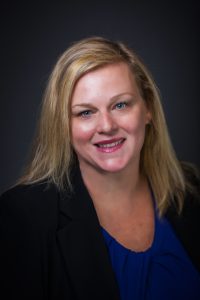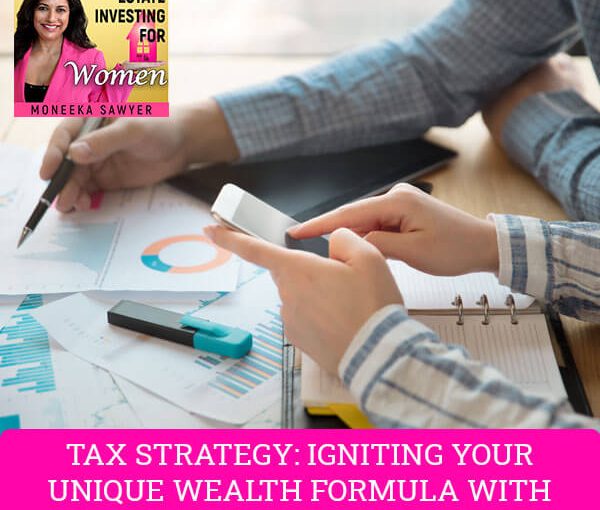Tax Strategy: Igniting Your Unique Wealth Formula With Lorraine And Jim Conaway

Your CPAs are your defense players; they’re defending the goal. Your tax strategists are the ones putting the points on the board. They make sure that you’re using the right and most efficient strategies. Join Moneeka Sawyer as she talks to Lorraine and Jim Conaway about tax strategies. They believe that success is truly about education, support, and the art of supercharging your unique style of wealth accumulation. Find out the difference between a CPA and a tax strategist. Discover the process and learn how they evaluate your taxes today!
—
Watch the episode here
Listen to the podcast here
Tax Strategy: Igniting Your Unique Wealth Formula With Lorraine And Jim Conaway
Real Estate Investing For Women
Using their extensive experience, knowledge and success in the world of tax strategies, real estate investing and other wealth vehicles, Jim and Lorraine used their straightforward, big-hearted style to guide thousands to ignite their unique wealth formula. With decades of success, designing and implementing customized wealth solutions, they appreciate that success is truly about education, support and the art of supercharging your unique style of wealth accumulation.
—
Jim and Lorraine, welcome to the show. It’s nice to see you.
It’s great to be here. Thank you.
We’re excited.
Lorraine has been on this show before. I’ve met Jim several times. We’re all in a mastermind together. I was so excited to share the two of them. Lorraine is so brilliant and shared such good stuff about the CARES Act. They’re such an incredible power couple. The 1 plus 1 does not equal 2 and equals 11. That is true. I’m so happy to have both of you with us. Let’s start with a little bit about the story of how you put this company together. You cover a lot of good stuff like all sorts of strategies around real estate. I remember when I first talked to Lorraine, my first thought was, “Where have you been all my life?” You talk about all these different strategies. The one that I am engaging you for is taxes. Let’s talk about how that piece started for you.
You would think that being a tax expert, a CPA, would make you a tax strategist. That is not the case.
It organically came together. We met in the business.
My first thought was, “Where has she been all my life?”
In the business, years ago, we were working at an insurance company. We started our company in 1996. We worked for ten years side by side with the CPA. Along the way, we started investing in real estate. My father is a contractor. He always had real estate. We had the real estate going on the side. We had our business working. We’re learning about taxes and finding that there was an enormous amount of money in the tax return. I was frustrated like, “Why are people talking about this?” Even in our situation, when we got our taxes done, our CPA said, “You could have saved $18,000 if you had this type of structure.” We’re like, “You tell me after the fact.”

Tax Strategy: Think of your CPA as your defense player; they’re preventing points by defending the goal. They’re not putting points on the board. The tax strategists are.
We have to spread the word, educate people and let them know that there are better ways of doing things. That you could keep much more money in your pocket and then get the education on real estate, not just investing but understanding how to maximize your real estate portfolio feeding in the tax strategy with the real estate and business. We’re business owners and entrepreneurs. Over the last few decades, it all came together like a recipe going, “This tastes good.”
You look at taxes differently. You are business owners. You two are not CPAs. You have a CPA team. You marry the business mind with the CPA mind, which I love. Talk to us a little bit more about what makes you or your team different from other accountants.
I’m going to jump in here and dovetail into something that Lorraine talked about. That was how we came to be about how we are. We learned by working side by side with CPA and learned an enormous amount working with that man and his practice. What we found was that by doing the tax strategy, we were having a greater impact than we were working with people’s assets. We learned to turn our world upside down and work from the tax down. What makes us different? Is there isn’t a class out there? There’s not a designation out there that says, “You’re a tax strategist.” This is where people disconnect. You would think that being a tax expert, a CPA would make them naturally a tax strategist. That is decidedly not the case.
My analogy is a sports analogy. Think of your CPA as your defense player. They’re preventing points by defending the goal. If you think about their language, that’s how they operate. “Can I defend this with the IRS? Does that make sense? Can we justify it?” Those are the words that you hear from them. They’re defense players. They’re not putting points on the board though. That’s our job. If you’re using the soccer analogy, think of your CPA as the goalie. Think of us as the kicker, the point, the guy that gets the ball and puts it into the other net to score points.
We came about how we are by organic growth, most of it from our painful experience. When you’re trying new recipes in the kitchen, that’s always a mess in the kitchen. What our clients get to enjoy is the fact that the recipes are all nicely laminated in cards. We’ve gone through. We know how long to leave things in the oven. The biggest difference is we are the people that are putting the strategies in place before the taxes.
Other people have brought it to our attention that said to us, “Do you know why you’re unique and why you’re different and why you have success?” I’m like, “Tell me why.” They say, “It’s because we focus on the implementation.” When you meet with somebody and they said, “You could get an entity, maybe do a cost sag on your real estate, deduct a certain way or your accounting, £6,000 on a vehicle and all of these things.” What happens is there’s a lot of information out there like on the internet. It’s like, “Who do I trust? Where do I go? What is the right fee?”
It’s like, “I get an entity. What’s the state that I live in? If I get an LLC, is it a partnership? Is it a disqualified partnership? Do I file as a SEVIS or C corp?” There are all these other questions that people are left with going, “I got information but who has time to sit with me, hold my hand and say, ‘This is too complicated. It’s too much. My CPA tells me to get an escort but my attorney tells me to get an LLC. Which one is right?’” What we like to do is get both parties on a joint call together and discuss it. Let’s get all on the same page. We’re advocates about teams, getting the right team on your side, working together collaboratively and not having to redo your strategy and focus on implementation. Almost all of our time is focused on implementing the strategies.
What I love is that if you’re working with a tax strategist, you have all of the team members available to you. They all understand similar strategies and are having conversations. I’m not talking to my lawyer bringing information to my CPA. I’m not playing the middleman. With me not knowing what I’m talking about in the first place, which is why I need them. We’ve got a middleman that’s educated, doing it themselves and understands the process.
Don’t treat people based on their checking accounts. Treat people based on who they are and provide as much value as possible.
In the past years, I’ve been using a tax attorney. This speaks to what Jim was talking about. The reason I used a tax attorney is that he’s on my side, not on the IRS’ side. He’s not playing defense. He’s playing business coordinator for me. In part of what he does for me if I were to ever get audited, as he represents me in court and that thing, they handled that whole picture. Jim, what you were saying about how we’re not playing defense rationally doing an implementation. You’re making the goals. How does that work? You are a CPA firm. Their responsibility is to the IRS. Could you speak to that a little bit more?
In my next appointment, I’m going to be sitting down with a CPA who only has several years of experience in advanced planning. I’m going to be sitting with him to review a tax strategy for a client. What I do is cook up all the good ideas that would apply to this client. We sit with our CPAs and edit them. “This would work but less of it. This would work, let’s do more of it. This won’t work at all. This works brilliantly.” We go through and do the checklist. When we do that, we have a tested strategy. We also put it in writing. The client has something to hold on to. I want to do 1, 2, 3, 4, 5, 6, 7, 8 different strategies.
I’ve got the rules and description. I understand it. If I want to read the document, most of our clients browse it. They don’t read it. They have a deliverable that they understand what the tax team is supposed to do. Here’s a critical element. The tax team also gets a copy of it so they understand what the taxpayer needs. If you were our client and we’re looking forward to working with you, you would get a deliverable that tells you all the strategies.
The tax team gets the same deliverable so that when they’re looking over the tax organizers, there are 50 pages of questions that nobody knows how to answer. You do your best and send it down. Our tax people look at this stuff. They see the strategy and don’t see the information they need. They know there’s a disconnect. Reach out to the client and ask them for the information. “How big is your house?” “It’s this big.” “How big is your studio with the lovely rice paper screen in the background?”

Tax Strategy: Tax strategists got the rules and descriptions. Their clients have a deliverable, so they understand what the tax team is supposed to do.
That all goes in there. You can see immediately that there’s an enormous amount of connection. Imagine for a minute that we’re sitting with you as our fresh client and we suggest, “Your tax strategy calls for a C corporation. Do we have a network partner that knows how to set up C corporations and that’s their focus and they’re good at it?” They’re already exercised and working with us as part of the team. That’s the thing that helps with the implementation. Everyone in the network that’s already been through the process knows. You don’t have to explain it. It’s one and done. Once you go, “I approve of this strategy,” then it’s off to the races. Everybody knows how to do what they got to do.
In the case of an audit, do you support your clients? How does that look?
What it looks like is we take a 40-year CPA and put that 40-year CPA between us and the bad guys. That 40-year CPA will handle most audit questions. Remember, every strategy is A) Legal, B) Approved, C) All the documentation is in the strategy. It’s like, “Here’s the homework. Where’s the mileage log? Where’s this log? Where’s that log?” We collect the data and put it together. We go and handle the audit. You should also know, this is one of my favorite questions is it a red flag?
I hear this all the time. When you get, “That’s a red flag,” don’t do and write that off. That makes your return auditable. Many right eyes I haven’t taken because of that.
Not true. It’s a myth. The thing that is more likely to cause an audit than anything else is the size of the numbers on your tax return. The larger the numbers, the more likely you’re going to be audited. Think about it. Logic. If you are a tax auditor-manager person, would you audit somebody who has had a $50,000 tax return? Would you audit the guy with a $500,000 tax return? It’s $500,000 all the time. What this tells us is that we have, roughly speaking, a 3% chance of an audit. If you went Vegas and you knew you could pull that handle on the one-armed bandit and you had a 97% chance of winning, how often would you be pulling that enamel?” We don’t want to push the IRS but we want to do everything that we’re legally entitled to. That’s what the strategy is all about.
It’s about following the rules. Another thing that I see is that when there are errors like we had somebody who doubled expense something or there’s not a matching item when it’s not matching, the IRS is going, “Why is this not matching? You got 1099 for X amount of dollars but you reported a different number.” Those types of things are errors. One thing I would say though, from my experience is that people who have very clean accounting and books either have a bookkeeper or they’re doing it themselves but they’re using like a QuickBooks process.
You get clean PNLs, no commingling of money in your corporate checking or your real estate, keeping the real estate separate from your checking account, you pay your groceries and your bills. You got to keep your real estate separate. When you have clean accounting then it’s so much easier process than going through an audit. When it’s commingled and muddy like that, it’s a nightmare.
Do you help people to understand what all of those things are? What is it exactly that we need to avoid this idea of commingling and stuff like that? It’s bigger than the account that you pay for your groceries and business account. I’ve got five different businesses. There are intricacies to that too. Do you help guide people on how to make that last money?
Typically, we’ll ask people, “Do you have a bookkeeper? Do you have a separate checking account?” Starting with the basics of having a separate checking account. When people ask us about those questions, we will go through them and go deep. When they don’t ask us, it’s because we’re covering so much material and education. Everybody’s so different. Some people have different specific needs and goals that they want to know answers to. They might be selling a property and are like, “I don’t want to do 1031,” or whatever it is. It’s all over the map.
We will help the people as much as we’re able to help the people. What we would do normally with bookkeeping is we’ll bring in somebody who is a CFO-level bookkeeper, have them audit the books and let us know exactly what they see. I spoke with a client. In 2021, we brought in our bookkeeper who was trying to be nice to the client, politely pointed out that there were some small changes that they needed to make in their bookkeeping. It turned out that was $540,000 worth of loss carryforwards that they had never reported. The bookkeeper found this error. They save taxes on over $500,000. It can be very valuable to have somebody go through and make sure the books are nice and neat, somebody with an accounting background, not just a bookkeeper.
Tell us what kind of person should engage you. Does it matter where a person lives?
It doesn’t matter where a person lives. They can live in any of the 50 states. We’re nationwide.
People who are alive. That’s the first criteria.
Typically, the people who have more complex and multiple returns have greater value. The more opportunity on saving taxes is the greater value. If you could save $500,000 in taxes, that’s great but there’s no minimum. We work with everybody.
Lorraine and I went through a season where we weren’t financially successful. This is way back when we were quite young. We remember what it was like and how it was when we got treated well and we didn’t get treated well. We committed that we weren’t going to treat people based on their checking accounts. We were going to treat people based on who they were and provide as much value as possible.
Let’s talk about costs. What is this going to cost? Are you going to give blissful investors a special deal?
To do an evaluation takes us quite a bit of work. The process is we reach out and we’re going to have the link. You go to the link. It’ll be a pink link.
They made a landing page especially for my community. As we were talking about it in the green room, I was like, “It has to be pink.” That’s what that reference is.
They will have the opportunity to raise their hand and say, “I would like to have my taxes evaluated to see if there’s any money to be saved.” The evaluation does take time and effort. It’s normally $497. How much are we charging the blissful investors?
We’ve discounted it to $97.
Save taxes so you can turn around and invest that money.
That’s the deal you ladies are getting. When you go to the website, which is BlissfulInvestor.com/taxstrategy, that’s where you would get the Last-Minute Tax Deductions, which is the free report.
It’s 2021 and they will be useful for 2022.
You also get the added benefit of 80% off of an actual consultation with them. Is there anything else you wanted to add before we go into the three rapid-fire questions?
I’m looking forward to people saving taxes so they can turn around and invest the money.
Find more real estate.
That’s the big thing. That money is saved for our businesses. Grow your real estate fempire. That’s what I’m calling it. Become a real estate mogul. It’s good to understand that this is a business strategy. Thank you for mentioning that. Here are our three rapid-fire questions. What’s a super tip on getting started in real estate investing?
The first thing is you have to understand that getting started in real estate means moving. I don’t care what you do. There’s no shortcut. It’s getting moving. If you’re in action, you can do something like wholesaling or sandwich places. You can save money and buy income properties. You can use your tax savings to help you save for your real estate. Get in motion. That’s the bottom line.
What is one strategy for being successful in real estate investing?
Saying yes to your wife.
That’s good advice. We need the guys to read this.
It’s managing the manager. Before you manage the manager, do some serious due diligence and find the right manager because you can have the most amazing property in the great area and grants and have terrible management. If the management is not responsive to the tenant, the tenant is going to move out. You’re going to have a vacancy and then the property is going to go downhill. Management is crucial and critical. Managing the manager is important and making sure you have the right manager.
Make sure that they’re going to be responsive to you, the investor.
You guys don’t do turnkey properties but you help people to find them to be working with teams that find you properties that have leverage. In real estate, we love to talk about leverage. Part of that leverage is our relationships. If you’re going with a turnkey operator or something like that, they have many properties so they can put pressure on the managers if things start to go sideways.
We do have vendors with properties with turnkey. We have already done the due diligence and have our properties with these vendors.

Tax Strategy: The thing that is more likely to cause an audit than anything else is the size of the numbers on your tax return. The larger the numbers, the more likely you’re going to be audited.
What was the cash-on-cash return for that one investor?
It was about a 20% cash-on-cash return. We also have amazing non-recourse lenders, which we can explain at another time.
We have to talk much more. We’ve got lending, turnkey, notes, self-directed IRAs and so many amazing things. This is why I was like, “Lorraine, where have you been all my life?” They’ve got all the different pieces and you’ve got access to them in one place.
The network has developed over the decades. Somebody said to me, “Do you know how valuable your address book is?” We don’t have address books but what I’m talking about is your network, your Rolodex. I was like, “I didn’t pay attention because I’ve been doing my job and working in expanding and getting all the pieces and all the people to bring it all together to create great success.”
I like both of you to answer this. What is one practice that you do daily that contributes to your success?
For me, it’s saying, “Yes, dear,” multiple times a day and staying very close to our real estate vendors and various network partners.
We don’t want to butt heads. Although we both meet with people, we have different roles in our business and working together. One thing for me is I focus on the critical things that I have to get done for the day before I even open an email. I have to get control of each day. Stay focused and accomplish what I said I was going to accomplish.
Thank you for that. We do have EXTRA. We’re going to be talking about the Augusta rule, which is a tax write-off that nobody seems to know about. It’s so interesting because when I did my tax evaluation, Lorraine was like, “You’ve heard about the Augusta rule. Why are you not using it?” I was like, “Can I use it? I’m just a little guy. What is this?” It could have saved me $20,000 in taxes. We ran the numbers. I’m super excited about it. It’s simple and available to many different people that wouldn’t expect it. That’s one of those little strategies that is often missed. It shouldn’t be. We’re going to talk in detail about that in EXTRA. Did you want to add anything to that?
No. I’m looking forward to speaking about that in your EXTRA.
Ladies, if you are subscribed to EXTRA, stay tuned. You’ll get to know about the Augusta rule. If you would like to subscribe to EXTRA but you have not yet, go to RealEstateInvestingForWomenEXTRA.com. The first seven days are free. Get in there. Seriously, this is the time to do it. If you don’t love it after seven days and you’ve gone through the content, you get to make that choice. For those of you that are leaving Jim, Lorraine and me, thank you so much for joining us for this portion of the show. I hope you enjoyed it and got great value. I look forward to seeing you next time. Until then. Remember, goals without action are just dreams. Get out there, take action and create the life your heart deeply desires. I’ll see you soon. Bye.
Important Links
- Jim Conaway and Lorraine Conaway
- Lorraine Conaway – Previous Episode
- BlissfulInvestor.com/taxstrategy
- RealEstateInvestingForWomenEXTRA.com
______________________________________
To listen to the EXTRA portion of this show go to RealEstateInvestingForWomenExtra.com
To see this program in video:
Search on Roku for Real Estate Investing 4 Women or go to this link: https://blissfulinvestor.com/biroku
On YouTube go to Real Estate Investing for Women
Moneeka Sawyer is often described as one of the most blissful people you will ever meet. She has been investing in Real Estate for over 20 years, so has been through all the different cycles of the market. Still, she has turned $10,000 into over $5,000,000, working only 5-10 hours per MONTH with very little stress.
While building her multi-million dollar business, she has traveled to over 55 countries, dances every single day, supports causes that are important to her, and spends lots of time with her husband of over 20 years.
She is the international best-selling author of the multiple award-winning books “Choose Bliss: The Power and Practice of Joy and Contentment” and “Real Estate Investing for Women: Expert Conversations to Increase Wealth and Happiness the Blissful Way.”
Moneeka has been featured on stages including Carnegie Hall and Nasdaq, radio, podcasts such as Achieve Your Goals with Hal Elrod, and TV stations including ABC, CBS, FOX, and the CW, impacting over 150 million people.
Cashflow And Tax Strategies: What The Wealthy Do With Stephanie Walter – Real Estate For Women

What do the wealthy do that makes them wealthy? We find out the answer to that and more in this episode. Moneeka Sawyer is joined by the co-founder of Erbe Wealth, Stephanie Walter. Stephanie talks about breaking away from corporate America and investing in real estate. She also shares insights learned from working with wealthy people, offering great cash flow and tax strategies that can give you the push towards their direction. Tune in to learn more tips from wealthy investors.
—
Watch the episode here
Listen to the podcast here
Cashflow And Tax Strategies: What The Wealthy Do With Stephanie Walter – Real Estate For Women
Real Estate Investing For Women
I am excited to welcome to the show, Stephanie Walter. She is the CEO of Erbe Wealth and a legacy cashflow specialist, capital raiser, syndicator and real estate investor. She has been a financial educator for many years and a real estate syndicator. Stephanie’s passion is teaching people to unlearn what most of us have been wired to think about money and re-educating people on attaining wealth that can be passed on to the next generation. Stephanie, welcome to the show. How are you?
I’m great. Thank you so much for having me.
I am excited about this conversation because there are many myths, ideas and lies that we are taught about money. I hope that’s not too strong a word but it’s awesome to have somebody come on board that’s going to share some of their wisdom around this. Before we get started, could you tell us a little bit about your story like how you got to where you are?
I started like most people into the corporate world out of college and realized not too long thereafter, when I was continually getting these 2% raises that, “This was not for me.” I quit my job and started an insurance agency in 2006. I’ve always loved real estate. I never had much training to it, so I went out and bought a lot of single-family homes and learned by my mistakes and successes on how to do that.
I decided I wanted to scale up in 2016 and get some great education and learn more about possibly buying apartment complexes or commercial real estate. I got into RE Mentor, which is an education program, like getting your Master’s in Real Estate. I did that and completed my first syndication in 2016. After that, I started getting to know people and became a partner with someone who didn’t like to raise money.
I started raising money at that time. Ever since I’ve worked a lot with wealthy people, I and that’s learned a lot from working with them about how they use their money, unlearning everything we’re all taught as fact. I transitioned a lot of my assets, doing what they were doing. I sold my day business, which is insurance and I’m retired. Other than I’ll continue to raise money. I like to teach people about what I’ve learned because I believe my path is definitely doable for everybody.
Could you share with us some of these things that you learned from wealthy people? What is true about wealthy people is they do think differently about money and investing than other people. What’s also interesting is how we define wealthy. I want to give a little bit of my perspective also on this and that. I live in California and people are impressed with the income that we make and the net worth that we have, but for a Californian, we’re upper-middle class.
Wealthy people live in a pretty average house. They drive pretty average cars, but their net worth is pretty impressive. Share on XWe’re not the wealthy around here. The wealthy around here are more like Bill Gates, Bezos and Zuck. Even though I’ve had a huge education in building wealth, my dad was a great mentor even as a young person, but still, I don’t think that I even have that real wealth mindset because I’m not a wealthy person in my community. I’m eager to know about people that define themselves as wealthy. What are those things that they do differently than the rest of us?
What’s interesting about that and you probably know that from where you live is that you’re not always going to recognize a very wealthy person. A very wealthy person, a lot that I deal with, you would never know. They live in a pretty average house and drive pretty average cars but their net worth is pretty impressive. The thing that you noticed by going through their finances pretty clearly is that they invest largely in real estate.
That’s the bulk of their investments. They invest directly in businesses, not in mutual funds. If they invest in the stock, it’s usually, “I got this tip from so-and-so.” It’s almost like their fund money but what they’re very concerned with doing and what they would probably tell you is that cashflow to them is more important than net worth.
There’s a perfect example of what you’re saying in your community is that you’ve got a lot of people that probably have very significant net worth but yet they may be working paycheck to paycheck to keep that lifestyle where it is. Whereas someone who’s wealthy is very concerned with cashflow that the cash flow is building up enough.
It replaces their income so that they can do what they want and love to do to contribute to society. The biggest thing that I learned is that most wealthy people don’t talk a lot about their net worth, even though it probably is pretty impressive but cashflow to them is huge. I learned that lesson myself because I live in Colorado. Colorado’s changed a lot. I started investing here in 2005 and needless to say, the prices have gone up unimaginably.
On paper, I had a very good net worth but I still had to work and continue running my business because I did not have a cashflow strategy in place for this money and I wasn’t very concerned with what my money was doing. Wealthy people know what their money is doing for them. They want the money to be working at all times for them. They view money as a tool that is working for them. That’s a mindset thing.
Until I transition different assets around to see how they were performing and analyzing, “What is my money doing for me?” It was largely inequity and it had a return of zero. To transition that into assets that would pay cashflow, as well as have a good interest rate return, that doesn’t take long to do that to have the goal of having the cashflow for you to be able to be truly wealthy, whatever that looks like for you.

What The Wealthy Do: Most wealthy people don’t really talk a lot about their net worth, even though it is probably pretty impressive, but cash flow is huge.
Talk to me a little bit about how that might translate for people that are not yet wealthy. How can they adopt those mindsets when so much of the time so many of us are living paycheck to paycheck and trying to survive but that wealthy mindset is available to us? Could you talk to us a little bit about that?
That’s another thing that I became pretty aware of when working with wealthy people is that they have a view that money is abundant. That sounds small to people but think about your view on money. Do you view money as, “There’s only so much of it and if I take some money from someone, then I’m making someone else less wealthy?”
They view money as a stream of water and that money is always flowing, abundant and coming. I didn’t probably have a mindset about money but once I did learn about the abundance mindset, I made a point of changing that. That sounds small but if you believe that money is flowing and coming, then it gives you a different perspective on money.
You say that’s small but it’s huge. That mindset tweak is huge. I was explaining this to a friend of mine and I got this image in my head that money is a little bit, rather than being like a stream where it’s inflow, it’s more like a fountain where it comes in, goes up and down, then it comes back in. It’s this circular thing. The power of the pump that makes that go is your willingness to circulate.
I donated to a woman I met $1,000. Everybody else was donating $10. Why did I do $1,000? To me, $1,000 is part of that pump. It’s more going out. That means that more will come in. The pump is stronger because there’s more circulating. Please forgive me. I hope that didn’t sound like a brag. Don’t spend beyond your needs. I’m not saying, “Go spend a ton of money.”
I’m saying that the circulation of money is imperative to creating wealth, community and to uplifting people. Unless money is going out, they are not jobs. Unless those people are not spending, there’s not a community. There’s nothing for us to do together. This is an interactive thing. All of us benefit from the spending and earning of money.
It’s not a zero-sum game this. Even for me, I came home and I was like, “That was such a great visual.” I want a strong pump in that fountain so that the circulation of that wealth is bigger, impacts more, stronger and more fun for me too. I like a powerful fountain. Does that sound right to you or do you feel like something is in there that doesn’t work?
Cash flow is more important than net worth. Share on XThat’s a great analogy. Something that offshoots from is that, granted there are stereotypes and all of that but wealthy people I meet that have been successful are very giving. It’s that same abundance mindset. There’s plenty for me to help you get. What I find very interesting about wealthy people, as opposed to the average person who does the 401(k), is they put their money into this because they’re told that’s what they need to do, a wealthy person invests their money teams of people and ideas.
Let’s use real estate as an example. They find a project that is compelling and interesting. They’ll do their due diligence but they’ll look for a team that has experience who has proven themselves to be successful. Then they’ll put their money into that team, step back and let the team do their thing. They’ll check in on the reports but largely, they’re passive.
Wealthy people invest in business plans and directly in the business. Whereas, us with a 401(k), who knows where our money is invested in? It’s invested in maybe thousands of companies that we know nothing about. They’ll invest their money directly in a business, someone’s business and, “What is this person’s business plan?”
It’s the same thing. They do all their due diligence but they invest directly to people and in people, more than a 401(k) or throwing your money out there and hoping that it grows but you’re not sure what you’re invested in. The wealthy are very conscious of who they’re investing in, where their money is and what it’s doing at all times.
Would you say that approach is true in real estate too for them?
Yes. I find that they don’t want to be the landlord and be managing. They want to understand the exit and business plan for this particular property and then they want to invest in it. They’ll sit back, review the quarterly reports, collect their monthly distributions of cashflow and do the same thing with another investment that comes along.
Talk to me a little bit about debunking these myths. What are those myths that you learned about from these people that we learn the opposite so much of the time?

What The Wealthy Do: Money is always flowing. It’s always flowing, and it’s always abundant. It’s always coming.
I’ve gone over a few of them already but big one is 401(k)s. That might not be a popular subject but I believe that we have to take a look at why we do things and if these things that have been set up for us by I’m not sure who work to our advantage or not. The thing that brought my attention to that is I look over lots of wealthy people and their financial statements. Virtually none had 401(k)s.
That was eye-opening because I was like, “What? I didn’t understand.” It didn’t compute to me. That’s a large myth and then you have to look in more closely. It makes sense because wealthy people want to know what their money is doing at any and all times. They want to know the returns that they’re generating and also what they prepare more than we do for taxes. By not preparing for taxes, that’s a huge thing that the majority of people don’t do.
If someone tells you how much they have in their 401(k), do they have that much in their 401(k)? In twenty years, what is the tax rate going to be and how much of what they have is going to be taxed? To simply not address your tax and mitigate for your taxes, it’s something that the wealthy do all the time. I use the analogy of these two people playing a game of chess and the regular Joe investor is looking one move at a time.
He’s looking, “How are my investments doing? What is the return?” While the wealthy person is looking several moves ahead. They’re checking, “How are my investments doing? On the other hand, what is my exit strategy? How can I mitigate for my taxes?” They’re looking side by side for income and taxes. That is why wealthy people get wealthy.
The myth that I understand there was saving your 401(k), your taxes will be less when you are finally pulling your money out. Don’t worry about that piece. You’re doing a tax-deferred type of program and you’re going to defer it so that you’re paying taxes later. In your experience or from what you’ve seen from the wealthy people, is that true that tax rates will be lower later?
No. Any of us can see what’s happening in our country regardless of what’s happening politically. We know that we’re spending a lot of money and in a lot of debt. People may not know this but our tax rates are on the low side. Historically, they’ve been much higher than they are. We know that the tax rates are going to change in the future. Are you prepared for that?
The tax rates are going to change but I also think that people don’t want to live a lesser lifestyle when they retire. For example, personally, I’m not going to want to retire until I can have the lifestyle that I have now without the work. What does that mean for me? I’ve got this lifestyle with this house and car and this excitement and joy for travel.
Wealthy people know what their money is doing for them. And they want the money to be working at all times for them. Share on XNow I’m not working, so I’ve got more time to travel more, hang out, hopefully take care of my parents more and my own health stuff. If I’m to look at my retirement, I’m going to say, “I need 50% more than what I’m making, at least, in order to continue to benefit from those many years of work.” I don’t want to have my lifestyle go down and be able to afford less.
Whatever my retirement vehicles are, if I’m pulling more than what I’m doing now, even if tax rates stay exactly the same, my tax rate has not gone down. It’s exactly the same. I’m not paying less taxes later but same tax. If the tax rates go up, now you’re paying even more. This whole idea of deferring taxes is an okay strategy.
Be aware that you’re not going to be paying less taxes later. You tell me what you think of this. You have money going in that’s compounding without being taxed, so it happens more quickly. You’ve got more on the backend, supposedly. That’s a compounding and a great investment strategy for growth, possibly depending on what you’re doing with it but it’s not necessarily a tax strategy.
I don’t want to tell everybody to get rid of your 401(k)s. A lot of people are into them but what I do say is be aware of what returns you’re getting. What fees are you paying? I ask a lot of people and they’re not aware of these things. You’ll look at the prospectus and what they’ve made over the last years. Sometimes it’s like 3% or 4% after fees.
I bring that to their attention and they were not aware of that. They’re looking at the long-term of what they think will be projected for them but it’s important to do things that will lower your fees especially, but also get the maximum growth that you can. People try to put off the financial responsibility onto whomever that is, whether that’s your Merrill Lynch person or the 401(k) administrator at your work.
Be more interactive with what’s going on, know what your options are. If you want to take part of your money from your 401(k), there are ways of investing some of that money, setting up a self-directed IRA and investing in real estate. There are other things that you can do and I honestly don’t have a preference but I want people to know that you should be in control and you probably know more than these professionals that are managing your money.
I want to do a deep dive into the analysis of a 401(k). Would you be interested in doing that with me on EXTRA?

What The Wealthy Do: Don’t be afraid to dive in, educate yourself, and learn that there are other investments outside of the stock market.
Sure. Thank you.
I want to dive deep because we have been trained. You’re so funny. You’re like, “I don’t know where that comes from,” and we all know that it was marketing. Somewhere along the way, this marketing trend started but we should not be subject to marketing only. We have the opportunity, with all the financial education that we have out there now to take a look at that. I’d love to do that in EXTRA. Do you have a way for people to reach you?
I get a lot of the same questions asked of me over again. I set up a group of question and answer videos. I keep adding to it every week. Hopefully, I’ll get up to about 100 of the most commonly asked questions. You can go to AskStephanieNow.com and you can get onto my website and look through some of those questions and answers. My actual website is www.ErbeWealth.com. There are tons of content. I find it very rewarding to be able to educate people. I’m constantly updating the content because I view this as my purpose in life. There’s plenty of reports, eBooks and all that great stuff.
I wanted to mention that there is a gift if they go to your website. That website is ErbeWealth.com. Tell us a little bit about one of the free reports people can get.
I have a report. It’s the Investment Report: Five Reasons Passive Investing Might Be For You. It’s a great dive into all the reasons that you may consider an investment that gives you a passive income every month.
Thank you for that. Stephanie, I have three Rapid-fire questions. Give us one super tip on getting started investing in real estate.
A wealthy person invests their money in people. They invest in teams of people. They invest in ideas. Share on XThe biggest tip I can give you is probably a mindset tip that you can do it and not be afraid to get educated. There’s so much information out on the internet about learning these investments that used to be reserved for very wealthy people, banks and insurance companies that are now available to us average people. The only reason that is the case is because of the information available on the internet. Don’t be afraid to dive in, educate yourself and learn that there are other investments outside of the stock market.
What would you say is one strategy for being successful in real estate investing? If you’re already in it, how do you be successful?
It’s setting goals. That’s a simple answer but it is true. When I started, I envisioned, “How could I retire?” I reverse engineered that back to, “How much do I need to come in every month?” From that, then I viewed money that I had and, “What is this money doing for me?” From that, I was able to eventually get enough money to replace my income.
Just having goals, maybe they don’t have to be that big and it’s, “I would like to do one and become alternate investment a year to see how this changes our lifestyle in terms of the passive income and the tax savings that you would get.” Be consistent. Whatever you’re doing, keep at it. I remember when I started investing in real estate, I was like, “I’m going to invest in one single-family home a year.” Have some goals and direction of what you see for your future and then act on it. I see lots of people that talk about it and don’t ever act on it. You go to act on it.
What would you say is one daily practice that you do that contributes to your personal success?
I blocked time for myself. That sounds very simple. Especially if you’re a mom or you’ve got lots of stuff going on. If you can block yourself time, let’s say, “I want to accomplish these three things,” or whatever they are and you know that you get that done every day. That’s going to move you ahead towards your goals.
This show so far has been amazing. Thank you so much for all that you’ve contributed. I can’t wait to get to EXTRA.
Thank you. Me too.
Ladies, stay tuned with Stephanie and me for EXTRA. We’re going to do a deep dive on 401(k)s and why that may not be the best investment for you and for a place to put your money. We’re going to talk about that. If you are subscribed, stay tuned. If you’re not but would like to be, go to RealEstateInvestingForWomenExtra.com.
You get seven days for free. Check it out and then you can stay on board or not. It’s up to you. For those of you that are leaving Stephanie and I, thank you so much for joining us for this portion of the show. I appreciate you and I look forward to next time. Until then, remember goals without action are just dreams. Get out there, take action and create the life your heart deeply desires. I’ll see you soon. Bye.
Important Links
About Stephanie Walters

Love the show? Subscribe, rate, review, and share!
Join the Real Estate Investing for Women Community today:
______________________________________
To listen to the EXTRA portion of this show go to RealEstateInvestingForWomenExtra.com
To see this program in video:
Search on Roku for Real Estate Investing 4 Women or go to this link: https://blissfulinvestor.com/biroku
On YouTube go to Real Estate Investing for Women
Moneeka Sawyer is often described as one of the most blissful people you will ever meet. She has been investing in Real Estate for over 20 years, so has been through all the different cycles of the market. Still, she has turned $10,000 into over $5,000,000, working only 5-10 hours per MONTH with very little stress.
While building her multi-million dollar business, she has traveled to over 55 countries, dances every single day, supports causes that are important to her, and spends lots of time with her husband of over 20 years.
She is the international best-selling author of the multiple award-winning books “Choose Bliss: The Power and Practice of Joy and Contentment” and “Real Estate Investing for Women: Expert Conversations to Increase Wealth and Happiness the Blissful Way.”
Moneeka has been featured on stages including Carnegie Hall and Nasdaq, radio, podcasts such as Achieve Your Goals with Hal Elrod, and TV stations including ABC, CBS, FOX, and the CW, impacting over 150 million people.


